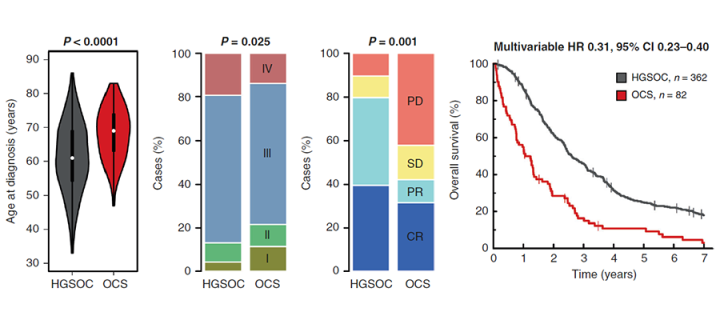Ovarian carcinosarcoma as a distinct form of ovarian cancer
Our investigators report detailed clinical and histopathological characterisation of the largest pathologically confirmed cohort of ovarian carcinosarcoma patients to date: August 2022

Ovarian carcinosarcoma (OCS), previously known as a malignant mixed Mullerian tumour, is an aggressive cancer of the ovary with characteristics of two types of cancer: carcinoma and sarcoma. OCS is a rare cancer and accounts for only about 1-4% of new ovarian cancer diagnoses. Possibly because of that, OCS has received relatively little research attention to date. Past research studies typically did not perform contemporary pathology review to confirm OCS diagnosis. Consequently, little is known about the relationship between different histopathological features of OCS and how they are related to clinical characteristics of OCS patients.
To start addressing this, Edinburgh Cancer Research investigators at the Institute of Genetics and Cancer used comprehensive clinical data about OCS patients (available through the Edinburgh Ovarian Cancer Database) and matched OCS samples (curated with support from the Edinburgh Experimental Cancer Medicine Centre) to perform detailed histopathological characterisation, analysis of features associated with survival and comparison against HGSOC. They published results of their work in the British Journal of Cancer in an article titled “Ovarian carcinosarcoma is a distinct form of ovarian cancer with poorer survival compared to tubo-ovarian high-grade serous carcinoma”.
The study showed that OCS represents an extremely aggressive form of ovarian cancer with distinct clinical behaviour compared to HGSOC. OCS patients were older, more likely to be diagnosed at early stage, demonstrated lower chemotherapy response rate and had significantly poorer survival than HGSOC patients. Histological subclassification of patients based on the carcinomatous and sarcomatous elements in the tumour did not identify patient subgroups with differential survival outcome, suggesting that histological features are not a useful tool for risk stratification. Importantly, the study indicates that OCS patients are poorly served by currently available treatment options, and new therapeutic strategies are urgently required to improve patient outcomes. In the absence of better treatments, it suggests that aggressive adjuvant chemotherapy should be considered for all cases, including those with early-stage disease.
Progress towards discovery of effective molecularly targeted agents for OCS has been hindered by lack of molecular characterisation in this tumour type, and this has impeded inclusion of OCS in clinical trials based on specific molecular defects, agnostic to disease site (so called BASKET trials). Hopefully this Edinburgh study highlighting poor outcomes and unmet needs of OCS patients will encourage more comprehensive molecular profiling work to identify potentially targetable aspects of disease biology. Such molecular profiling studies should represent an immediate research priority.
The study was funded by a grant from Tenovus Scotland and received additional support from the Nicola Murray Foundation and Cancer Research UK. It was performed as part of the Nicola Murray Centre for Ovarian Cancer Research, CRUK Scotland Centre and Edinburgh Experimental Cancer Medicine Centre activities.
So far the number of comprehensively characterised ovarian carcinosarcoma (OCS) samples is very low. Our study reports results from analysis of the largest pathologically confirmed OCS cohort to date and provides important insights that should aid future clinical developments. It emphasises the aggressive nature of OCS and highlights unmet clinical needs of OCS patients.
Related Links
Article in the British Journal of Cancer:
https://www.nature.com/articles/s41416-022-01874-8
Professor Simon Herrington group website:
https://www.ed.ac.uk/cancer-centre/research/herrington-group
Professor Charlie Gourley group website:
https://www.ed.ac.uk/cancer-centre/research/gourley-group
Information about ovarian cancer:
https://www.cancerresearchuk.org/about-cancer/ovarian-cancer
Related Stories
Trametinib as a new standard of care option for low-grade serous ovarian cancer
Opportunities for stratification in endometrioid ovarian carcinoma
Molecular stratification of endometrioid ovarian carcinoma predicts clinical outcome
Olaparib approved in Scotland as new ovarian cancer treatment
Drug trial offers hope of improved ovarian cancer treatments

